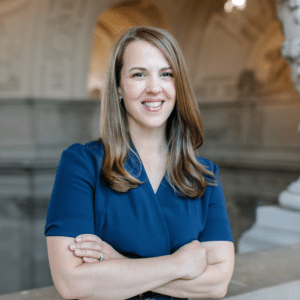
By ProFellow Founder, Dr. Vicki Johnson
I’ve been helping people find and win funding for graduate school and professional development for more than a decade. As you can probably imagine, I’ve heard every reason in the book as to why one can’t apply to a competitive opportunity like a master’s or doctoral degree.
However, all of these excuses stem from one thing: fear. Fear of applying to a competitive graduate program usually starts with a trusted mentor telling you to be “more realistic.” Or a friend or family member suggesting it would be best to put off your goal until certain circumstances improve. Or just the everyday pressures of paying bills, working on your career, and caring for others that cause you to put your dreams on the backburner. Meanwhile, the months and years go by, and the next thing you know, you are in the same place where you started when you first considered pursuing a graduate degree.
What’s really holding you back are unfounded fears that YOU can overcome! Here are 5 myths holding you back from pursuing a master’s or doctoral degree.
#1 I can’t afford graduate school.
What many people don’t know is that there are hundreds of high-quality fully funded graduate programs, as well as full funding awards, to achieve a Ph.D. or master’s degree. A “fully funded” Ph.D. or master’s program is a program that offers a “full funding” package to all students accepted to the program. Full funding is full tuition coverage plus an annual living stipend for the duration of your studies. Full funding can come in the form of a “no-strings-attached” fellowship, sometimes awarded to a small number of top applicants. Full funding can also come in the form of an Assistantship (also called a Studentship or Instructorship), which is a part-time job with the university that is exclusively for graduate students. With an Assistantship, you will be required to provide research, teaching or administrative assistance to the university (typically 10-15 hours per week), but this work is often complementary to your studies and provides valuable work experience to add to your CV or resume.
That said, you have to know where to find full funding opportunities. Another thing many people don’t know is that universities tend to reserve full funding awards for full-time, on-campus students. Part-time and online programs that are geared toward working professionals typically do not offer scholarships, fellowships or Assistantships. Therefore, you should consider attending graduate school full-time so that you can be eligible for these sources of university funding! As a full-time, fully funded student you can still work part-time to supplement your income for your living expenses, but as a part-time student working full-time, you’ll likely be paying for your tuition out of pocket through your income, savings or student loans.
#2 I can’t apply if I don’t do well on the GRE (or other required test).
I’ve got good news, folks! Test scores, like the Graduate Record Exam (GRE), are no longer paramount in Admissions decisions, and many schools are no longer requiring them. Also, few graduate programs outside the U.S. require the GRE or similar tests. Although once considered to be an “objective” way to assess candidates’ skills and aptitudes, these tests have now been found to be a poor determinant of an applicant’s success both as a student and graduate. That said, with or without a test requirement, selection committees do need to see examples from your professional and academic track record of why you’ll be successful as a student. For a professional degree, like a Master’s in Business Administration (MBA), you may need to have a strong professional record of achievement. For a research degree, like a Ph.D., you may need to have previous research experience and contributions to publications to be a competitive candidate. If you have worked hard as a student or professional and have the record and references to prove it, you can gain acceptance to a competitive graduate program with or without strong test scores.
#3 A graduate degree will pigeon-hole me into one career track.
A graduate degree can provide skills, expertise and professional development opportunities, but the type and discipline of your degree is not going to lock you forever into one career track. As someone who has changed careers 3 times, from government to academia to entrepreneurship, I would argue that the number one thing that helps you advance in ANY career track is the growth and quality of your professional network. Therefore, as long as you can demonstrate in your job applications and interviews that what you learned or researched during your graduate studies is relevant and useful to the job you are applying to, the actual discipline or type of your degree matters little.
Also, many people who have no intention of working in academia quickly abandon the idea of pursuing a Ph.D. because of its length and its presumably limited career tracks, and miss great opportunities to achieve full funding for their graduate degree! Full funding is more common at the doctoral level than at the master’s level, and a Ph.D. can lead to high-level positions in almost any non-academic industry as long as you choose your dissertation topic carefully and pursue professional development opportunities while you are a student. Therefore, don’t rule out a Ph.D.!
#4 I’m too old.
Believe it or not, there’s no age limit for applying to a master’s or doctoral degree! Although it might seem so since student cohorts are often filled with people in their 20s and 30s, the fact of the matter is, few people over the age of 40 apply to graduate school. But this doesn’t mean you can’t achieve acceptance (in fact, two students over the age of 50 were in my own Ph.D. cohort!). What many older applicants miss in their applications is a clear and compelling reason why they are applying for graduate school at mid or late career. Although “pursuing a lifelong dream of completing a graduate degree” might be your major motivator, that’s not a good reason to select you for the program. What selection committees want to know is what social impact you will make as a graduate. If you plan to use your graduate degree to pursue teaching, research, public service or leadership, make that clear! Explain in your application how the graduate degree will provide you the skills, expertise and credentials for a specific career goal and what impact you’ll make in this next stage of your career.
#5 I don’t have what it takes to get accepted.
I’m no stranger to the fear of putting yourself into a competition with people who have outstanding credentials. Yet, many people underestimate their accomplishments and competitiveness for graduate school. People sometimes assume it’s all about the “numbers” like former grades and test scores, when in fact, it’s really about your ability to show your potential for future success in your written application, using specific examples of your accomplishments, perseverance and drive. Candidates also don’t realize that selection committees are more dedicated than ever to diversity and inclusion, and may be seeking candidates just like you.
That said, applying to graduate school and being a competitive candidate is no easy task. You’ll need to find programs (ideally with full funding) that will help you achieve your goals, take required tests, create a compelling personal statement, update your CV, request recommendation letters, and possibly prepare a research proposal. You’ll need to start early and commit to the process. You can overcome all the myths holding you back and achieve a high quality graduate degree when you are ready to put in the time and effort needed to achieve this goal.
You don’t have to do this alone!
You can find many fully funded graduate programs and awards that will help you achieve your career goals, and there are many ways you can strengthen your application and give yourself an edge over other top candidates.
If you don’t want to do this alone, you can join my new online course and mentorship program, Fully Funded, and learn the application secrets of multi-award winners to prepare a competitive application to fully funded Ph.D. and master’s programs and full funding awards, like a Fulbright, Pickering, Payne or Soros Fellowship.
I have many success stories from people like you who joined Fully Funded because they were held back by the fear of the cost, their age, their low test scores, or the intensity of the competition.
Want to learn more? Join the VIP Waiting List for my award-winning Fully Funded Course and Mentorship Program for graduate school applicants.

Dr. Vicki Johnson is Founder and CEO of ProFellow, the world’s leading online resource for professional and academic fellowships. She is a four-time fellow, top Ph.D. scholar, Fulbright recipient and an award-winning social entrepreneur. She is the Creator and Director of Fully Funded, an award-winning online course and mentorship program for graduate school applicants seeking to find and win full funding.
© Victoria Johnson / ProFellow, LLC 2020, all rights reserved